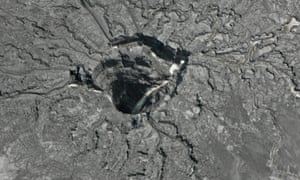The governor of Florida, Ron DeSantis, declared a state of emergency on Saturday after a significant leak at a large pond at the old Piney Point phosphate mine threatened to burst a system that stores water polluted with radioactive materials.
- ‘No longer safe to be anywhere near Piney Point’, says official
- Millions of gallons of wastewater contain radium and uranium

Officials evacuated homes and closed off a highway near the large reservoir in the Tampa Bay area, north of Bradenton. Residents a mile north and a half-mile south of the pond received an alert via text saying to leave the area immediately because collapse was “imminent”.
The state department of environmental protection said a break was detected on Friday in one wall of a 77-acre pond that has a depth of 25ft and holds millions of gallons of water containing phosphorus and nitrogen from the old phosphate plant.
Officials brought in rocks and materials to plug the hole but were unsuccessful.
Manatee county administrator Scott Hopes said at a press conference on Saturday the most pressing concern was that the water could flood the area, though population density there was low.
“We are talking about the potential of about 600m gallons within a matter of seconds and minutes leaving that retention pool and going around the surrounding area,” he said.
Workers were pumping out thousands of gallons per minute to bring the volume down. Pumping the entire pond would take 10 to 12 days. Others were working to chart a path for controlling how the water can flow from the pond into the Tampa Bay.
DeSantis’ declaration of a state of emergency allocated more resources for response and recovery. The pond owner, HRK Holdings, did not respond to a request for comment.
The pond at the old Piney Point phosphate mine sits in a stack of phosphogypsum, a waste product from manufacturing fertilizer that is radioactive. It contains small amounts of naturally occurring radium and uranium. The stacks can also release large concentrations of radon gas.
Hopes said that if the pond collapsed, it could destabilize other areas in the plant.
“The pond is basically salt water,” he said. “We saw ducks yesterday, there are snooks [fish] swimming in there. It’s sustaining wildlife. That’s not the case for the other two pools.”
The wastewater in the other ponds would need to be treated to reduce ammonium content and other materials, Hopes said.
The Florida agriculture commissioner, Nikki Fried, urged DeSantis to convene an emergency session of the state cabinet, adding that the Piney Point property has seen similar leaks in the past.
“The immediate evacuation of residents, disruption of families during Easter weekend and potential environmental catastrophe requires the attention and action of Florida’s statewide elected leadership,” Fried said.
George Kruse, a Manatee county commissioner, said he was at the plant on Saturday with other officials and had to clear the area quickly.
“We determined that it was no longer safe to be anywhere near Piney Point, so we all kind of raced off the stacks as fast as we could,” Kruse said in a Facebook video.

In 2016, more than 200m gallons of contaminated waste water from another fertilizer plant in central Florida leaked into one of the state’s main aquifers after a massive sinkhole opened up in a pond of a phosphogypsum stack.
There are at least 70 gypsum stacks in the US and about 27 in Florida, mostly in the west-central part of the state. Wastewater stored in the gypsum stacks cannot be seen from the ground as the piles surrounding the structure can go as high as 500ft.
*Original article online at https://www.theguardian.com/us-news/2021/apr/03/florida-emergency-piney-point-phosphate-plant-pond-leak-radioactive-flood-ron-desantis
